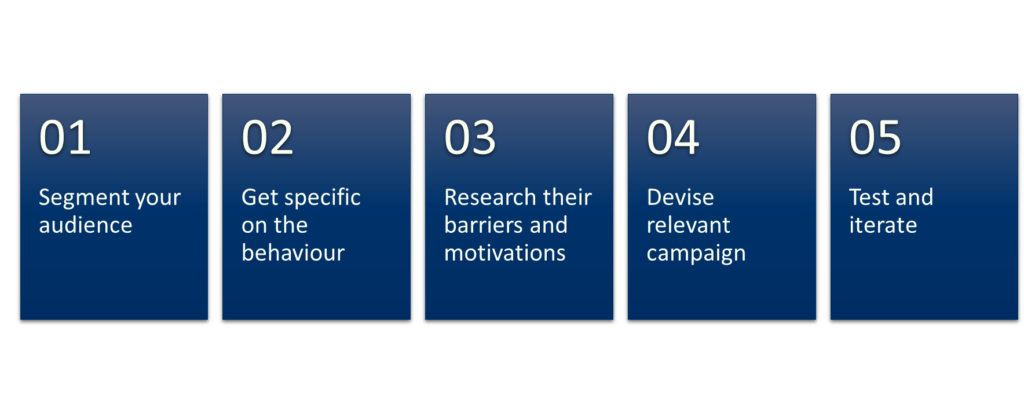
Local authority
As a local authority, you have a remit to deliver behaviour change to meet your net-zero and waste targets
But how do you engage the wide range of citizens in your region, on a limited budget?

Do you have campaigns or targets for:
Increasing low carbon travel
Retrofitting and energy efficient housing stock
Improving energy efficiency with businesses
Reducing waste creation and recycling contamination
Engaging citizens with nature
Working with landowners on pesticide reduction

‘Everyone’ is not an audience!
When capacity and budgets are limited, it is tempting to consider developing a one-size-fits-all campaign.
But all the research demonstrates that different people have different barriers and motivators to change.
Audience segmentation is key. Targeted campaigns are more impactful. For instance, parents of young children may have more barriers to cycling to work than a single person.
The good news is there are a lot of audience segmentation tools, such as the Britain Talks Climate toolkit, which provide insights and guidance for communicating climate for different audiences.

Awareness raising doesn’t create behaviour change. Why?
When you’re passionate about an issue, you want to raise awareness to make others care too. And it can be frustrating when they don’t respond with as much passion, urgency or desire for change as you.
But that’s because awareness raising doesn’t create behaviour change.
In fact, the knowledge-action gap demonstrates that even when people know about an issue and its causes, they may still continue with high-carbon or wasteful lifestyle activities e.g. flying, driving short distances.
Behaviour change initiatives must go beyond informing people of the problem and solution.
To create change, we need to understand and minimise the barriers to action, as well as increasing the motivations for your audiences.

The behavioural approach to change
There are a number of behavioural science frameworks that help with navigating the barriers and solutions to behaviour change. The commonalities between these is they consider:
The individual and the cognitive influences
Social cues and influences
The role of infrastructure and systems
But rather than jumping to developing a campaign, the behavioural approach requires you to:

This may sound overwhelming, but there is already a lot of research, processes, tools and frameworks to follow.


The Sustainable Sidekicks can support you with:
Bespoke services
- Bespoke behaviour change training workshops – developed for your strategy, project officers and comms team we can create a bespoke workshop that addresses your key impact areas
- Research services – we will gather valuable insights from your stakeholders through surveys and interviews and literature reviews on your focus area
- Campaign support – get expert insights and feedback on how and where to improve your campaign with a behavioural science lens
On-demand training courses

Case studies
- Communications campaigns for West Midlands Combined Authority
- Developing waste initiatives with Bristol waste
- Engaging citizens in low-carbon travel across a city
- Reviewing waste campaigns across Peterborough and Cambridge
- Co-creating campaigns across the West of England
- Food waste trial research supports bid for wider funding
- Tools to tackle Local Authority waste challenges
Who am I?
I’m Livvy, a behaviour change and sustainability consultant on a mission to engage people beyond the green echo chamber and help changemakers, like you, create real impact!
Since getting involved with sustainability consultancy and environmental campaigning, it became clear to me that knowledge and education was not enough to deliver change and that there were other factors at play.
Applying the principles of behavioural science to plastics, waste and carbon reduction campaigns has opened up so many more ways to understand the challenges we face and to achieve change with much wider audiences.




